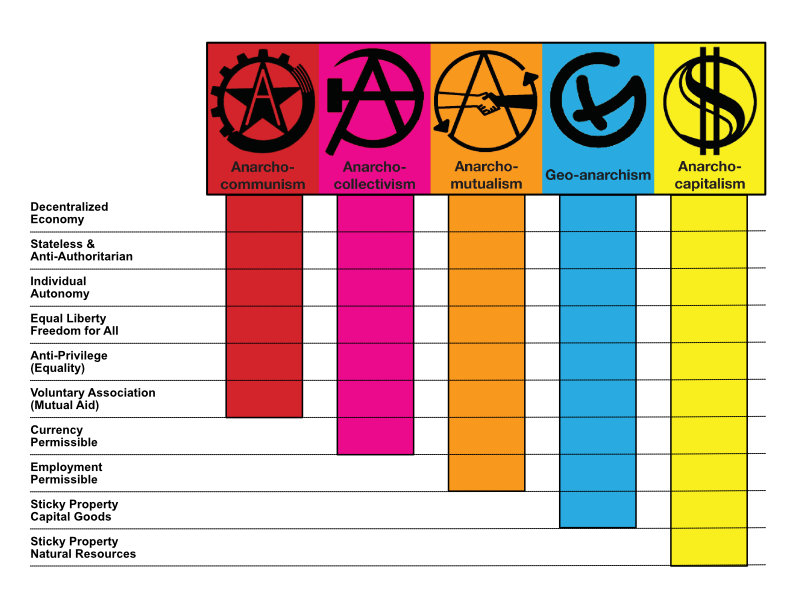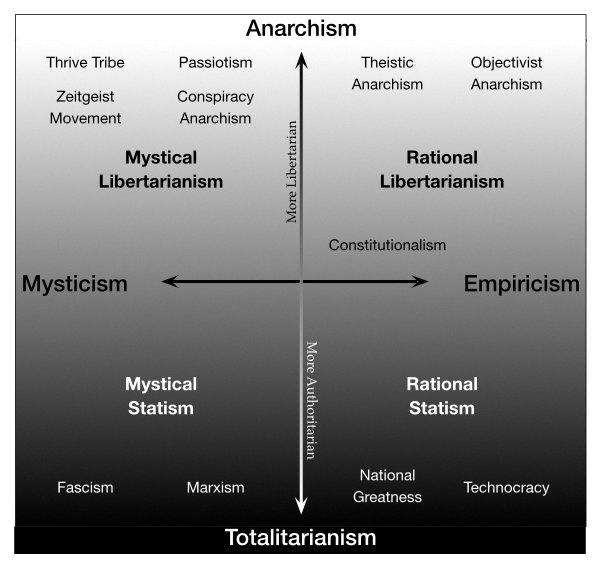Anarchism: An Alternative Typology
The anarchist idea is that political authority is invalid. For all but moral skeptics, such as Max Stirner acolytes, this means that political authority is morally wrong and should be ignored or abolished. All anarchists agree about this Liberty versus Authority dimension of human interaction in general, and politics in particular. But for values and issues not directly related to opposition to political authority, anarchists have a wide range of views. An anarchist can theoretically hold any view that is consistent with statelessness, hence the wide diversity of beliefs among anarchists. Most commonly, we categorize these views on the basis of economics and criteria related to the production of goods and services. Thus we have anarcho-communists debating anarcho-capitalists in online forums, and picture the anarchist spectrum as ranging from extreme collectivism to extreme individualism, or more precisely, as extreme anti-propertarianism to extreme propertarianism. The "measure" on this scale is how close to pure neo-Lockean "sticky" property* each school's vision is.


Sometimes it is mind-expanding to see things in a new light - in a totally different manner. After all, the debates in the Ancap vs. Ancom Group are getting boring and predictable. Let's try a new perspective: mysticism versus empiricism. Let's look at the way various anarchists see reality and judge what is true. Why is this interesting? Because one might wish to understand anarchists who do not think the same way, who have fundamentally different epistemologies, yet come to the same anarchist positions. Also, there are strategic implications. Should we try to promote anarchism among both types of world-views? Is one worldview more favorable to anarchism than the other? Do the different economic schools map onto the various epistemological schools, or are the economic and epistemological concepts more or less independent of each other?
For our purposes, mysticism is defined as: a belief that "all is one," and that a body of important knowledge comes from revelation from a supernatural deity or cosmos or "all." Empiricism is that belief that reality is a given, and knowledge comes from correct discernment of reality. I will use "rational" and "empirical" interchangeably. Put another way, mystics believe that Reality has intentions (as if it was a person) and that sufficiently evolved people are both one with, and informed by, this intentional cosmos/god thing. On the other hand, empiricists believe that reality is not intentional, but an ultimate but inanimate object that can be observed and studied and utilized. One way we might gauge this mysticism/empiricism dimension for various anarchists is to look at
- acceptance of science and scientific explanations
- attitude toward new technologies (pro-tech or Luddite)
- susceptibility to believing conspiracy theories
- which is the fundamental evil - the State or the Occult Global Conspirators
One would expect empiricists to be pro-science, pro technological progress, and generally dismissive of so-called "conspiracy theories." Rational empiricists who are anarchists tend to see the State as the fundamental evil.We would expect mystics to have the opposite attitudes for each of these. For some mystic groups, one must scratch beneath the surface to discover the anti-scientific attitudes. For example, one anarcho-mystic group (the Thrivers) has a colorful facade of scientific progress, but upon examination the "science" it offers is a hodgepodge of long-discredited bunk science notions like "free energy" along with alleged "suppressed technologies" bestowed upon humanity by alien visitors from outer space.
Below I plot some anarchist "movements" I know about, along with some standard statist ones. The Thrive Tribe is the movement headed by Foster and Kimberly Gamble, which combines anarchism with new age mysticism and numerous conspiracy theories, and the belief that GDP (Global Domination Project) elites are the enemy of humankind. The Zeitgeist movement, aka the Venus Project, has a similar faux-scientific appearance and extols technology, but unscientifically assumes that scarcity disappears, resulting in pretty but naive dreams about how life would be sans scarcity. Those seem to be the most mystic, i.e. anti-empirical movements. Less mystic is Mark Passio's brand of Natural Law, which attempts to combine New Age mysticism with Ayn Rand Objectivism. The objectivism gets the short end in this "compromise." The main enemy of Passiotists is a secret Occult, basically equivalent to the Thrivist's Global Dominators. Both see it as a permanent group of evildoers conspiring against mankind. (Other names for the Big Conspiracy are: the Illuminati, the Rothchilds, the Khazarian Mafia, the Old (Chinese) Families, the Freemasons, Black Hats, bad aliens, or simply "the Cabal.")


Conspiracy anarchism is more of a catch-all term for those anarchists who see the State not as an institution of plunder, as classical anarchists and objectivist anarchists do, but rather the State and its rulers as dupes or flunkies of the Occult Global Dominators. Put another way, rational anarchists tend to see the State as selling aggression-power to special interest groups and cronies, so the State (and cartels of States) are the fundamental problem. Mystic anarchists tend to see The Evil Global Conspiracy as the main evil, controlling States and rulers, and in turn everyone. Which is the horse and which is the cart? And how much does it matter, if killing the State solves the problem, either way?
On to the Rational Libertarian quadrant, we have theistic anarchists, which include not only Tolstoy Christians and basically all anarchists who believe in supernatural critters, but also paleo-anarchists like Hans-Hermann Hoppe who have narrow insular views about morality, to the extent that all other views are a danger to liberty. Intolerant people such as that tend to believe in a god or gods. Finally, at the most empirical extreme, are the Objectivist Anarchists, who tend to be atheist freethinkers with great respect for the scientific method and are enthusiastic about new technology. In general, the mystics tend to be afraid that new technologies will be destructive, whereas the rationalists tend to be optimistic about how technology can enhance freedom. One example: Mystics are more likely to see crypto-currency (or digital currency) as a plot to spy and control people, whereas rationalists are likely to see the possibility of ending corporatized banking and as a tool for financial freedom.
Constitutionalists tend to have a blind faith that "their" State will enforce its founding constitution with integrity. This, of course, is a delusion which both logic and history disprove. But their childish faith does prevent them from wanting a stronger (more aggressive) State, thus they are libertarian in the minarchist sense. The hard-core statist movements are easy to understand. Fascism is explicitly based on myth rather than fact. Marxism has the faith-based hallucination that humankind can be molded into something that could live in their kind of super-egalitarian society - the "New Communist Man." This anti-empirical utopian belief puts Marxism clearly in the mystic half-plane. Rational Statism takes a utilitarian, or at least consequentialist, approach. There are the patriot flag-humper types who believe in maximizing national greatness, and then there are the ultra-"scientific" people who favor a technocracy, as if all values and goals are already determined, with optimization and implementation the only issues. Rational statists tend to favor a mommy and/or daddy State, with the people its little children.
Probably most of the economic schools of anarchism, from anarcho-socialism to mutualism to geoism to anarcho-capitalism, are all in the Rational Libertarian quadrant. Another interesting grouping is the Fascists and statist Communists are together. Is this typology really any worse than the usual economic one?
* Sticky property is when the owner of a resource keeps ownership (more or less) until he consents to gift or sell it. This is also called non-proviso Lockean or simply neo-Lockean property. Mutualists and socialists prefer possession property, where one keeps ownership only (more or less) so long as one is using it.
